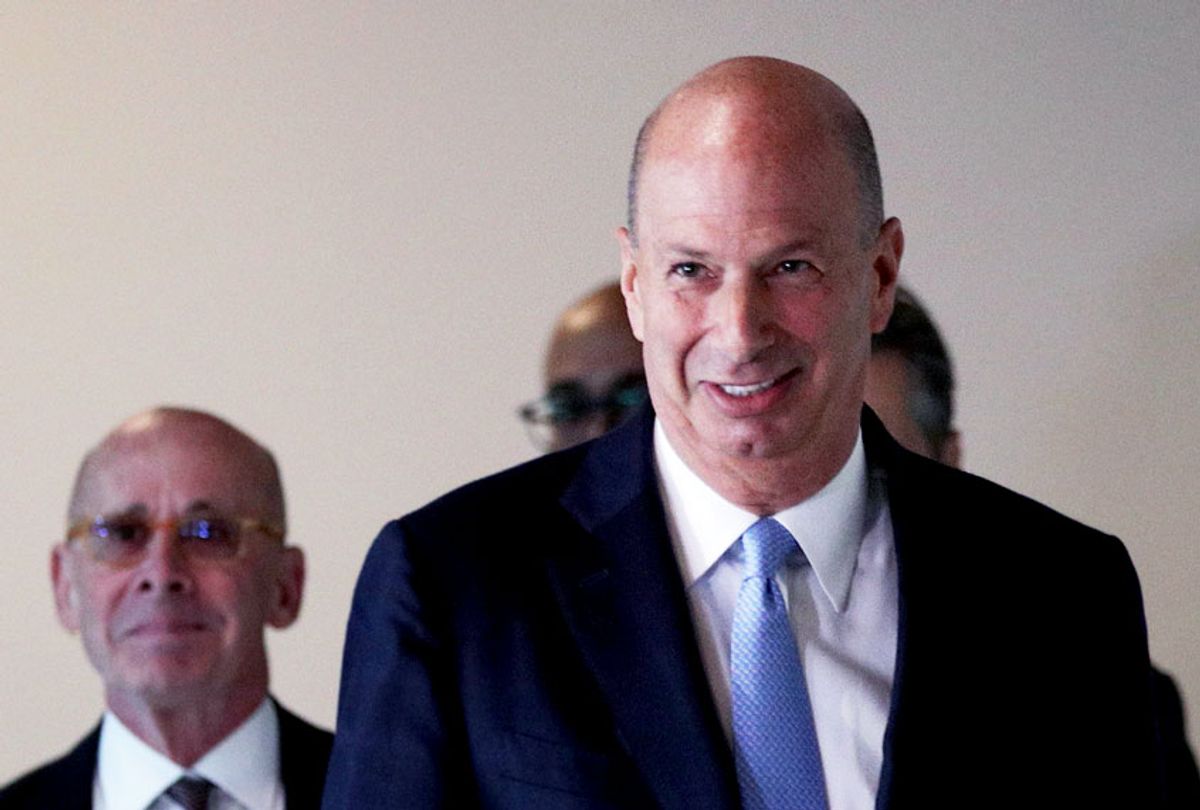Gordon Sondland, the U.S. ambassador to the European Union, has changed his testimony in the House impeachment inquiry to acknowledge a quid pro quo linking President Donald Trump’s demand for an investigation into former Vice President and military aid to Ukraine.
Sondland’s attorneys on Tuesday submitted a substantial three-page update to his testimony from last month after Ukraine envoy Bill Taylor and National Security Council official Tim Morrison contradicted Sondland's earlier statements that he had “no discussions” about the Bidens with anyone at the White House or the State Department.
Sondland claimed in the update that the opening statements released from the depositions of Taylor and Morrison “refreshed my recollection about certain conversations.” He proceeded to describe the alleged quid pro quo, which Trump and the White House have repeatedly denied.
“I told Mr. Morrison in early September 2019 that the resumption of U.S. aid to Ukraine had become tied a to a public statement issued by Ukraine agreeing to investigate Burisma,” Sondland said, referring to a Ukrainian energy firm whose board included Biden’s son. “I told Mr. Morrison that I had conveyed this message to [Ukrainian presidential aide] Mr. Yermak on Sept. 1, 2019, in connection with Vice President Pence’s visit to Warsaw and a meeting with [Ukranian President Volodymyr] Zelensky . . . I said to him in early September that resumption of U.S. aid to Ukraine might be conditioned on a public statement reopening the Burisma investigation.”
Sondland said the condition “had been communicated by Rudy Giuliani, with whom President Trump directed Ambassador Volker, Secretary Perry and me . . . to discuss issues related to the president’s concerns about Ukraine.”
Sondland added that he and the other officials “understood that satisfying Mr. Giuliani was a condition for scheduling the White House visit” sought by Zelensky.
The testimonies of Taylor and Morrison “refreshed my recollection about conversations involving the suspension of U.S. aid,” Sondland claimed
“I always believed that suspending aid to Ukraine was ill-advised, although I did not know (and still do not know) when, why or by whom the aid was suspended,” he continued, adding that he “presumed” the aid was linked to statements Giuliani and Trump wanted Zelensky to make.
“I now do recall” a conversation in Warsaw, Sondland added, referring to a conversation with Yermak, a top aide to Zelensky.
After Zelensky raised the issue of the suspended aid, Sondland said, “I now recall speaking individually with Mr. Yermak, where I said that resumption of U.S. aid would likely not occur until Ukraine provided the public anti-corruption statement that we had been discussing for weeks.”
The update marks the first admission by a senior official in direct contact with Trump that military aid to Ukraine was tied to a demand for a probe of Biden. While Trump has accused Taylor and top National Security official Alexander Vindman of being “Never Trumpers,” Sondland is a Trump supporter who donated $1 million to the president's inaugural committee before being tapped for his post in Brussels.
Congress also released the transcript of Sondland’s testimony from last month, which shows that the ambassador believed the effort by Trump and Giuliani to extort an investigation into a political opponent from a foreign country was illicit.
Asked if “investigating Biden or involving Ukraine in Trump’s re-election” was “illegal,” Sondland replied, “I’m not a lawyer, but I assume so.”
Sondland denied in text messages to Taylor that there had been a quid pro quo but testified to Congress last month that he was simply repeating what Trump had instructed him to say.
Sondland’s updated testimony complicates matters for Republicans defending the president, though they have already ignored multiple administration officials who similarly confirmed a quid pro quo. Senate Judiciary Committee chairman Lindsey Graham, R-S.C., a staunch Trump ally, claimed last month that he would support Trump’s impeachment “if you could show me that Trump actually was engaging in a quid pro quo, outside the phone call.” That is exactly what Sondland has done.
"Show me something that is a crime,” Graham told Axios. “That would be disturbing.”
Asked during his deposition if Trump’s actions in Ukraine were a crime, Sondland repeated his earlier claim that it was likely illegal.
“Again, I’m not a lawyer. I don’t know the law exactly,” Sondland told impeachment investigators. “It doesn’t sound good.”

Shares